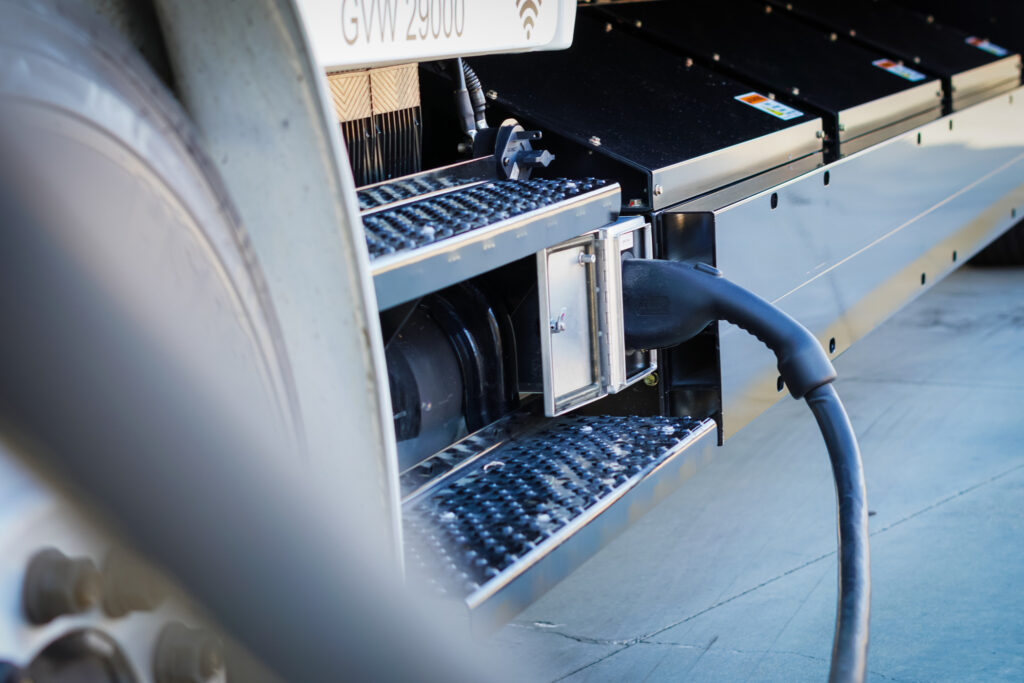B.C. introduces weight allowances for battery-electric trucks and fuel cells
British Columbia is offsetting some of the heavier weights associated with battery-electric trucks and equipment that runs on fuel cells.
A 1,500 kg weight allowance is being introduced for full-sized electric commercial vehicles, while a 1,000 kg allowance is being offered for those with fuel cells. Maximum gross combination vehicle weights rise to a respective 65,000 and 64,500 kg.

The changes align with allowances already made for trucks and buses that run on liquified natural gas (LNG) and compressed natural gas (CNG), the province says.
Initial allowances will be made available through letters of authorization. And after a 90-day notice period, CNG, LNG and LNG/diesel bi-fueled vehicles will also require such letters.
“We’re the only province or territory to offer a weight allowance incentive that empowers trucking companies to make investments in clean technology upgrades, knowing with confidence that it will be a sound investment for them,” said Rob Fleming, minister of transportation and infrastructure, in a related press release.
“Promoting the adoption of green technology is not only central to our commitment to fighting climate change, but is essential to positioning the province for a strong economic recovery.”
“Compared to low- and zero-carbon passenger vehicles, clean technology for heavy-duty vehicles is still in early development,” said Dave Earle, president and CEO of the BC Trucking Association. “These weight allowances make low-emission options more affordable for the trucking companies and drivers serving communities across British Columbia.”
“By working with the trucking industry, we’re accelerating the transition to a cleaner economy by making it easier for zero emission heavy-duty vehicles to get on the roads,” said George Heyman, minister of environment and climate change strategy.
Medium- and heavy-duty commercial vehicles are currently responsible for half of the greenhouse gas emissions generated by the province’s road transportation sector.
The province’s economic recovery plan, StrongerBC, included $31 million for the Go Electric Specialty-Use Vehicle Incentives (SUVI), doubling the maximum rebates available for electrified medium- and heavy-duty vehicles. The incentives cover up to 33% of the cost of eligible vehicles, with maximum rebates reaching up to $100,000 per vehicle.
And B.C.’s 2021 budget includes $94 million for the CleanBC Go Electric Program, which offers rebates for zero-emissions vehicles and charging stations.
The North American Council for Freight Efficiency (NACFE) previously identified the Cascadia region stretching between Vancouver and Oregon as one of North America’s most favorable settings for electric truck rollouts.
Have your say
This is a moderated forum. Comments will no longer be published unless they are accompanied by a first and last name and a verifiable email address. (Today's Trucking will not publish or share the email address.) Profane language and content deemed to be libelous, racist, or threatening in nature will not be published under any circumstances.
This added weight makes sense no sense, I thought the cap on weights was for protection to the roadways, if they can support the extra weight than any vehicle should be able to use those weights, by trying to electric and fuel cell comparable for pay load the tax payer will have to pay the extra cost of road repairs and replacement.